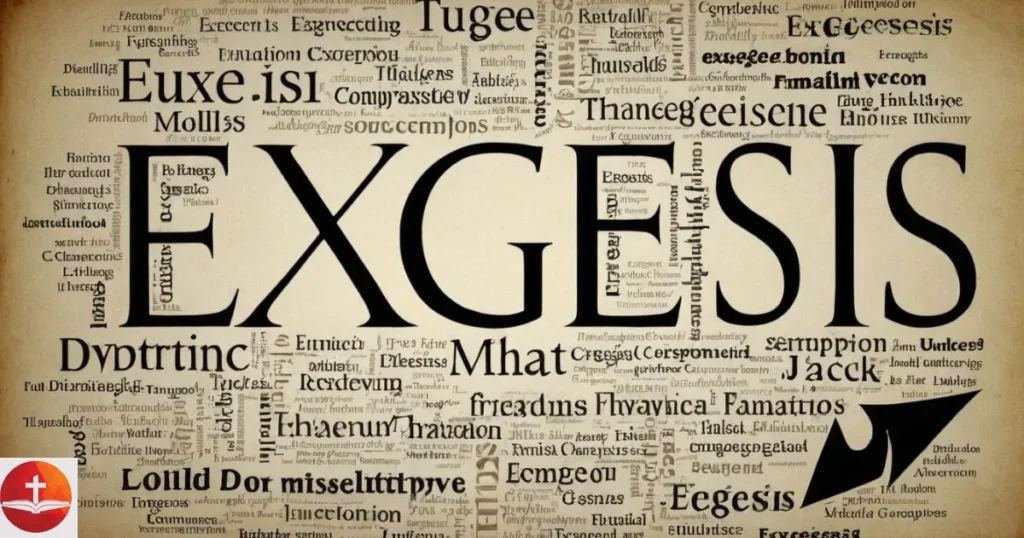“Exegesis and Eisegesis shape how we understand and apply the Bible’s teachings.”
Interpreting the Bible is a significant task that requires careful consideration of context, history, and intent. Two primary approaches to interpretation are Exegesis and Eisegesis. Understanding the difference between these methods is essential for accurate biblical interpretation.
This article explores the key differences between Exegesis and Eisegesis and provides insights into their importance in understanding scripture.
What is Exegesis?

Exegesis is the process of drawing out the original meaning of a text based on its context, historical background, and the author’s intent. This approach seeks to uncover the true message of the scripture by analyzing the language, culture, and circumstances surrounding the text.
The Importance of Context
Context is crucial in Exegesis as it helps to understand the text in its original setting. By considering the surrounding verses, chapters, and books, one can gain a clearer understanding of the passage’s intended meaning.
- Scripture: “No prophecy of Scripture is a matter of one’s own interpretation.” (2 Peter 1:20)

The Role of History
Historical analysis is a key component of Exegesis. By examining the historical events, customs, and practices during the time the text was written, one can better understand the author’s message and its relevance to the original audience.
- Scripture: “For whatever was written in former days was written for our instruction.” (Romans 15:4)
What is Eisegesis?

Eisegesis is the process of interpreting a text by reading one’s own ideas, beliefs, or biases into it. This approach often leads to subjective interpretations that may not align with the original intent of the scripture.
The Influence of Personal Bias
Eisegesis can be influenced by personal biases, leading to interpretations that reflect the reader’s own opinions rather than the text’s true meaning. This approach can result in misinterpretation and distortion of the scripture.
- Scripture: “Every word of God proves true; He is a shield to those who take refuge in Him.” (Proverbs 30:5)

The Dangers of Subjectivity
Subjectivity in Eisegesis can lead to a fragmented understanding of the Bible. When readers impose their own views onto the text, they risk overlooking the broader message and context of the scripture.
- Scripture: “Do not add to His words, or He will rebuke you and prove you a liar.” (Proverbs 30:6)
The Process of Exegesis

Exegesis involves a systematic approach to interpretation that includes careful analysis of the text’s language, structure, and meaning. This method seeks to uncover the original message of the scripture by considering various factors.
Language and Grammar
Understanding the original language and grammar of the text is essential in Exegesis. By analyzing the words and phrases used by the author, one can gain deeper insights into the meaning of the passage.
- Scripture: “Heaven and earth will pass away, but My words will never pass away.” (Matthew 24:35)
Theological Implications
Exegesis also involves exploring the theological implications of the text. By considering the broader theological themes within the scripture, one can understand how the passage fits into the overall message of the Bible.
- Scripture: “For the word of God is living and active, sharper than any two-edged sword.” (Hebrews 4:12)
Scriptures to Pray Over Your Children
The Process of Eisegesis

Eisegesis often lacks a systematic approach, as it is driven by the reader’s personal views and experiences. This method can lead to interpretations that reflect the reader’s own ideas rather than the text’s intended meaning.
The Role of Personal Experience
Personal experience can influence how one interprets scripture through Eisegesis. While personal experiences can provide valuable insights, they can also lead to a subjective understanding that may not align with the original intent of the text.
- Scripture: “For I know the plans I have for you, declares the LORD, plans for welfare and not for evil.” (Jeremiah 29:11)
The Pitfalls of Eisegesis
The pitfalls of Eisegesis include the risk of reading personal beliefs into the text, which can distort the original message. This approach can lead to interpretations that are more reflective of the reader’s desires than the scripture’s true meaning.
- Scripture: “You shall not add to the word that I command you, nor take from it.” (Deuteronomy 4:2)
Balancing Exegesis and Eisegesis

While Exegesis and Eisegesis are distinct methods, both can offer valuable insights when balanced correctly. Exegesis provides a foundation of accurate interpretation, while Eisegesis allows for personal reflection.
The Need for Discernment

Discernment is essential in balancing Exegesis and Eisegesis. By discerning the proper application of each method, one can gain a deeper and more accurate understanding of the Bible.
- Scripture: “Test everything; hold fast what is good.” (1 Thessalonians 5:21)
The Role of Tradition
Tradition can also play a role in balancing Exegesis and Eisegesis. By considering both the original context and the insights of tradition, individuals can gain a deeper understanding of the Bible.
- Scripture: “Therefore, brethren, stand fast, and hold the traditions which ye have been taught, whether by word, or our epistle.” (2 Thessalonians 2:15)
The Dangers of Overemphasizing Eisegesis
Overemphasizing Eisegesis can lead to a distorted understanding of the Bible, as personal opinions and biases overshadow the original meaning of the text. This approach can result in misinterpretation and misapplication of scripture.
- Scripture: “Trust in the LORD with all thine heart; and lean not unto thine own understanding.” (Proverbs 3:5)
The Spiritual Benefits of Exegesis

Exegesis offers significant spiritual benefits, as it encourages a deeper understanding of scripture and a closer relationship with God. By carefully analyzing the text, individuals can gain insights that are relevant to their spiritual journey.
- Scripture: “Thy word is a lamp unto my feet, and a light unto my path.” (Psalm 119:105)
The Role of Community in Interpretation
Interpretation is not just an individual endeavor but also a communal one. Engaging with others in Bible study and discussion can provide different perspectives and insights. Community interpretation helps to balance personal biases and deepen the understanding of scripture.
- Scripture: “Iron sharpeneth iron; so a man sharpeneth the countenance of his friend.” (Proverbs 27:17)
Exegesis vs eisegesis got questions
Exegesis is the process of interpreting a text by drawing out its original meaning based on historical and linguistic context. Scholars use this method to understand what the author intended. Eisegesis, on the other hand, occurs when someone imposes their own ideas or biases onto a text, leading to a subjective interpretation rather than an objective one.
Exegesis vs. Eisegesis in Catholicism
The Catholic Church emphasizes exegesis in biblical interpretation, relying on tradition, Church teachings, and historical context to understand Scripture correctly. Eisegesis is discouraged, as it can lead to misinterpretations that conflict with the Church’s teachings. The Magisterium ensures that exegesis aligns with authentic doctrine and avoids personal biases.
Exegesis vs. Eisegesis Pronunciation
The word exegesis is pronounced “ek-suh-JEE-sis”, while eisegesis is pronounced “eye-suh-JEE-sis”. Both terms share the Greek root “gesis,” meaning “to lead,” but differ in their prefixes—“ex-“ (out of) and “eis-“ (into), reflecting their opposite meanings.
Hermeneutics vs. Exegesis vs. Eisegesis
Hermeneutics is the broad discipline of interpretation, particularly of religious or philosophical texts. Exegesis is a method within hermeneutics that seeks to extract the true meaning of a text. Eisegesis, however, contradicts exegesis by inserting personal interpretations rather than deriving meaning from the text itself.
Exegesis vs. Eisegesis Examples
An example of exegesis is analyzing Jesus’ parables by considering the historical and cultural context of His time. An example of eisegesis would be interpreting a biblical passage to support a personal belief, even if it contradicts the original message. Scholars warn against eisegesis because it can distort the intended meaning of Scripture.
Answer o Key Question
- What is the main difference between Exegesis and Eisegesis?
Exegesis draws meaning from the text; Eisegesis reads meaning into it. - Why is context important in Exegesis?
Context ensures the interpretation aligns with the original intent of the text. - How can Eisegesis lead to misinterpretation?
Eisegesis can distort the text by imposing personal biases and ideas. - What role does prayer play in Exegesis?
Prayer invites divine guidance, helping to interpret the text correctly. - Can tradition influence Exegesis?
Yes, tradition provides historical insights, but must be balanced with textual analysis. - Why should Eisegesis be approached cautiously?
Eisegesis can lead to subjective interpretations that may deviate from the true message of the Bible.
Conclusion
Understanding the distinction between Exegesis and Eisegesis is crucial for anyone seeking to interpret the Bible accurately. Exegesis, with its focus on context, history, and original intent, provides a reliable method for uncovering the true meaning of scripture.
Eisegesis, while allowing for personal reflection, can lead to misinterpretation if not approached carefully. By prioritizing the original meaning of the text and seeking divine guidance through prayer, individuals can deepen their understanding of the Bible and grow in their faith.

Hi! I’m Jane Austen, a writer passionate about exploring the stories and teachings of the Bible. On my website, BiblePulze, I share insights and reflections to help readers deepen their understanding of the Bible and its relevance to our lives today. I strive to make biblical teachings accessible and engaging for everyone.

